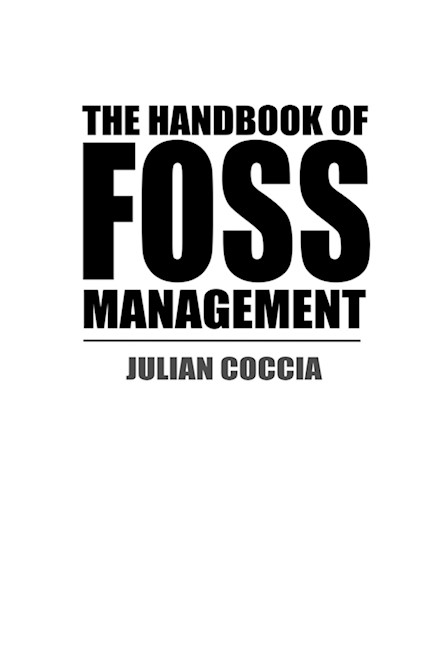
Books I have read: The Handbook of FOSS Management
StarOffice was an office suite developed by a German company that Sun Microsystems acquired many years ago. The acquisition was at a time when Microsoft Office suite (Word, Excel etc) had become dominant on the market. Sun decided to challenge Microsoft.
Sun made StarOffice free to use! I remember this as a big thing. It was possible to use this complete office suite in a legal way without paying a penny. At this point of time, I think it may not have been free for companies and other commercial usage, but as private person it became free. I do not remember when I started to use StarOffice, but it was a long time ago. At a later stage, if I remember correctly, StarOffice became a variant with a small fee due to it included some non-free content like graphical symbols, while at the same time OpenOffice emerged as a free variant. Above is written from top of my mind. A quick check with Wikipedia tells me I remember more or less correctly, but the story is somewhat complex.
Today OpenOffice is free for anybody to use, including commercial usage. It is a Free and Open Source Software, FOSS, under the Apache license.
I still use OpenOffice on a more or less daily basis. Today maybe LibreOffice is more known and used, and is more actively developed. LibreOffice is based on OpenOffice, and is also a FOSS.
Last few years I have finally started to explore Linux-based operating systems for desktop and laptop computers; GNU/Linux. Very many Linux-based OS are FOSS, for example Linux Mint which is a favorite for me. Thousands of FOSS programs are available and ready to use for Linux desktop.
Hardware electronic components, that is resistors and so on, have been part of almost all of my professional career. Those components have in my case been purchased from other companies to be included in our products. The components are listed with their approved manufacturers in a data base. I was involved as a reference team member in this data base and its user interface. Several years ago we discussed in this reference team that also software components needed to be handled and probably this was the first time I had to think about components that do not have any direct purchase cost for the component.
Also in later years I have been working with Software Component Engineers as colleagues and been involved in similarities and differences in handling of software and hardware components, and tools for the component management. FOSS is one important type of software components.
A fantastic world of FOSS software exist for both private persons and commercial usage. FOSS is not only complete programs like OpenOffice, but also shorter codes, e.g. snippets, for a specific function, which are handy to reuse for the software engineer.
Although FOSS is free, it is not that simple. Especially not for companies. Normally a licence is connected to this free usage of the FOSS; which typically means you are free to use, include, modify or further develop your own software based on the "original" FOSS software. Like LibreOffice is based on OpenOffice. But the licence typically means you must share your own work with the software. As a company you must understand this and only use FOSS in a way that works for you. Another consideration can be if any issue is found with the FOSS - there is no commercial contract with obligation that the FOSS developer should fix the issue (bugs, vulnerabilities etc).
Julian Coccia has been working with FOSS management over many years. He also has been my colleague working at the same department.
"The Handbook of FOSS Management", is written by Julian Coccia, with the aim to address how to handle FOSS from a company perspective.
The book starts with general information about FOSS. It is not a book that gives a complete and comprehensive information about FOSS. The focus is on FOSS management in companies. In this book Julian shares his best practice of FOSS management. Julian is positive to FOSS, but FOSS needs consideration, knowledge and management. FOSS management needs collaboration between functions such as software engineers, legal skills e.g. in a sourcing department, patent skills and business skills.
FOSS requires analyze, considerations, decisions as well as proper administration. The book gives an overview of all kind of aspects of FOSS management, written by a person who has been deeply into the subject in daily work.
Although this book is from 2013 it is a good start for anyone who should organize, work with or needs to become aware of FOSS possibilities and challenges in a business environment.
Henrik Hemrin
23 July 2020
Comments powered by CComment